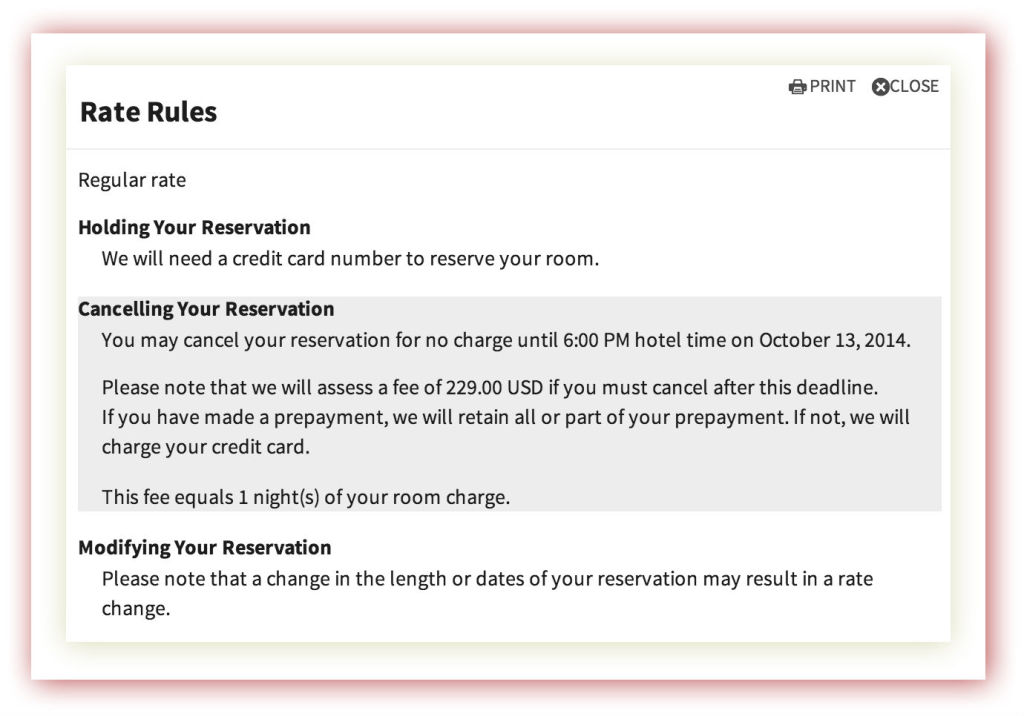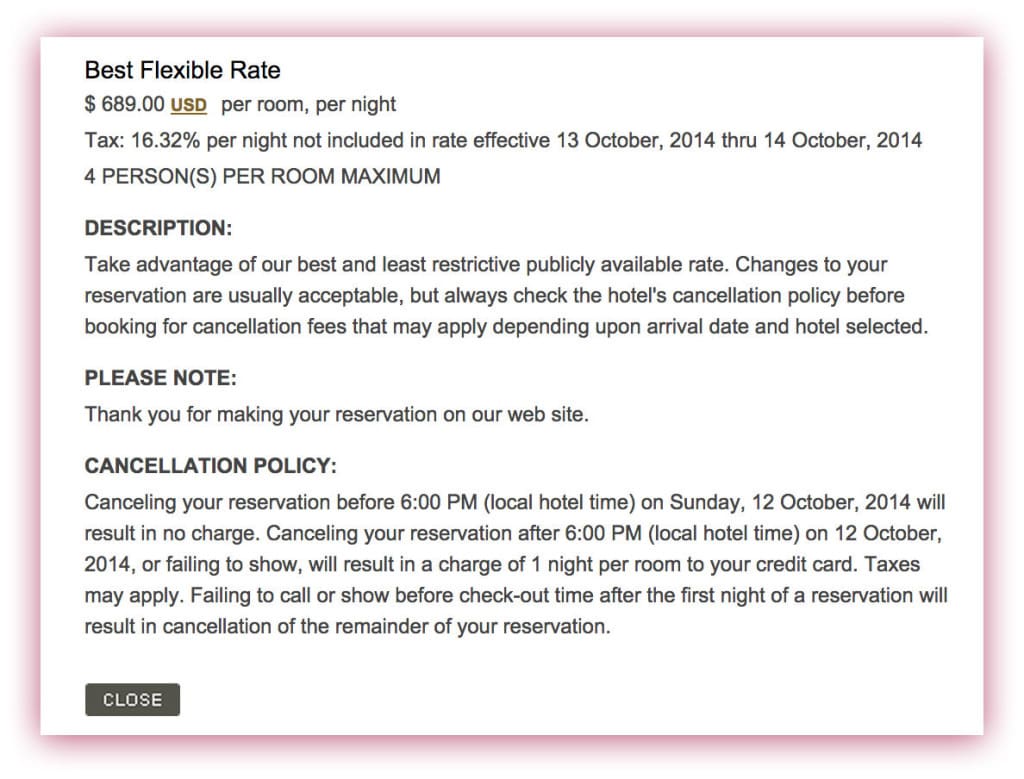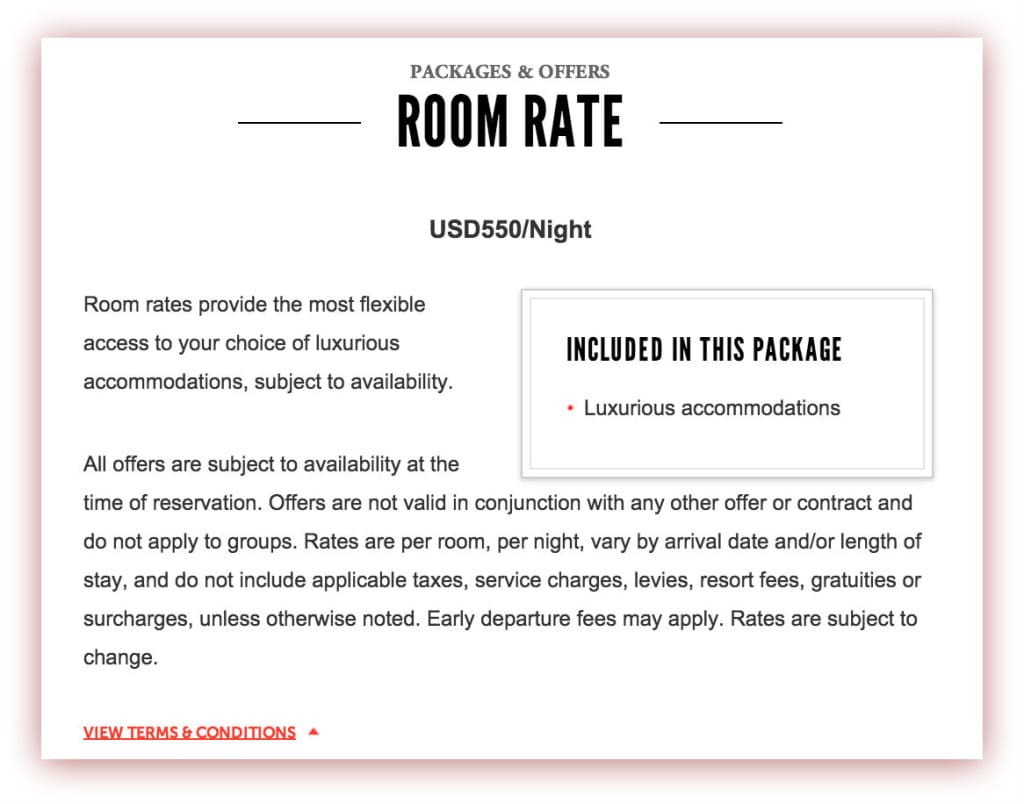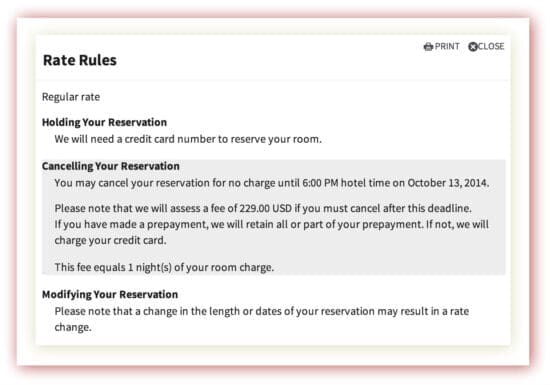
Starting Jan. 1, 2015, Marriott International will officially adopt a stricter reservation cancellation policy than what is currently in place at most of its properties, TravelUpdate.com has learned.
Marriott told Travel Update that the goal is to sell more rooms, as opposed to collecting more reservation penalty fees.
Once the policy takes effect, consumers will have until 11:59 p.m. local time the day before check-in in order to avoid paying a penalty charge, according to the email obtained by Travel Update that Marriott sent to hotel operators on Friday.
Marriott expects that “most hotels will want to follow the new policy,” according to the email. Marriott, in fact, is telling franchised hotels that if they want to opt out of the new policy and continue offering a “day of arrival” cancellation deadline, they must request permission to do so.
GET SOCIAL: Barb DeLollis is on Twitter and Instagram
MORE ONLINE: Hotels give fitness buffs a new toy – TRX ropes
MORE ONLINE: Hilton now operates 400 DoubleTree hotels
So is this a negative development for Marriott fans?
Yes, and no. It depends on the hotel’s current policy, and whether the hotel will adopt the new policy. There are two ways to view the impact for Marriott’s more frequent guests:
- Negative for consumers: At Marriott-brand hotels that currently allow guests to cancel their reservation by 6 p.m. the day of check-in (such as the Marriott at Dallas/Fort Worth airport), the new policy will give consumers 18 fewer hours of wiggle room. They would have less flexibility.
- Positive for consumers: At Marriott-brand hotels that currently require guests to cancel 24 or more hours ahead of check-in time, the new policy – if adopted – will give consumers more flexibility. It’s not clear, however, if those hotels will adopt the more lenient policy.
But on a broader level, Marriott’s new policy is positive precedent for consumers, says Bjorn Hanson, a clinical professor with the NYU School of Professional Studies Preston Robert Tisch Center. Hanson for years has closely tracked the U.S. hotel industry’s growing affection for charging hidden fees and charges, which has included reduced flexibility to cancel reservations.
“This is a positive development in terms of fees and surcharges,” he told me.
The industry’s most generous cancellation policy – 6 p.m., day of – has been vanishing for years.
“That 6 p.m. day of arrival (cancellation deadline) is old news and increasingly harder to find,” Hanson said during an interview Friday. “(The deadline) has been moving to 24, 48 or 72 hours in advance of the 6 p.m. day of arrival. So (Marriott’s new policy) is not good news when compared to a decade ago, but it’s very good news when compared to emerging trends over the last seven years.”
Another plus for consumers is that incentivizing guests who might change their plans to give up rooms earlier could actually help a traveler who’s in need of a room, Hanson said.
“It gives the hotel time to either contact the travelers who might be on a waiting list or add the room to its inventory. But it is also very fair because most travelers would know by midnight about a change in plans by midnight the day before travel.”
In response to Travel Update’s questions to Marriott about the policy change, Marriott spokeswoman Felicia Farrar McLemore said that about 25% “of our managed hotels in the Americas have a cancellation policy that is more aggressive than 6pm day of arrival.” So in many markets, she said, the new policy will put Marriott “in line with our competitors.”
In its email to hoteliers, Marriott notes that the policy change comes at a time of record breaking demand for hotel rooms. In July, for instance, industry tracker STR reported that the U.S. hotel industry sold a record 113 million room nights that month alone. Marriott’s email says:
“Demand for lodging is at an all-time high, and across the industry, more rooms are being occupied than ever before. We expect that 2015 will be another record-breaking year for occupancy, which means now is a good time to modify our reservation cancellation policy to help hotels better manage their inventory.
Overview of Policy Change
The new policy will change the cancellation deadline from the day of arrival (e.g., 12:00, 4:00 or 6:00 p.m.) to 11:59 p.m. local time on the day prior to arrival. The change to the cancellation policy gives Revenue Management more time to manage inventory and make strategy adjustments, thereby increasing the ability to mitigate loss from short-term cancellations. Many of our competitors have already moved to a 24-hour cancellation policy, and many hotels within the Marriott portfolio have already implemented a more aggressive cancellation policy (note: hotels currently following a more restrictive policy will not be impacted by this change).
In response to Travel Update’s question as to whether Marriott expects the new policy to increase cancellation fee revenue, Marriott spokeswoman Felicia Farrar McLemore sent this response:
“While the intent for this change is not to collect more cancellation fees, our desire is to sell rooms that would have otherwise gone unoccupied due to a guest’s last minute cancellation.”

Per the rate rules above, the InterContinental in San Francisco requires a guest to cancel a reservation for Oct. 13 by 6 p.m. on Oct. 12 to avoid a penalty. Travel Update screen shot.
A random sample check of other hotels’ cancellation policies for non-pre-paid room rates for an Oct. 13 booking all require guests to cancel at least 24 hours in advance, which makes Marriott’s new policy appear more flexible:

- Westin Georgetown in Washington D.C.: “If you cancel between 10/10/2014 and 6:00 PM hotel time on 10/12/2014, there will be no forfeiture amount. If you cancel after 6:00 PM hotel time on 10/12/2014, the forfeiture amount will be a 1 night stay. There may be additional applicable charges and taxes.”
- Andaz in Savannah, Ga.: “Cancel 48 hours Prior To Arrival To Avoid One Night Pnlty”
- Four Seasons Denver: “All cancellations must be received by 6:00 pm Denver time at least 24 hours prior to expected date of arrival, or a penalty equal to one night’s room rate plus tax and service charges will be charged. The same penalty applies to no-shows. Any material changes requested within the cancellation period are subject to approval by the Hotel.”
- InterContinental in San Francisco: “Canceling your reservation before 6:00 PM (local hotel time) on Sunday, 12 October, 2014 will result in no charge. Canceling your reservation after 6:00 PM (local hotel time) on 12 October, 2014, or failing to show, will result in a charge of 1 night per room to your credit card. Taxes may apply. Failing to call or show before check-out time after the first night of a reservation will result in cancellation of the remainder of your reservation.”
Readers: Have you had an experience recently where you wound up paying for a room that you didn’t cancel in time? Please share your story.










9 comments